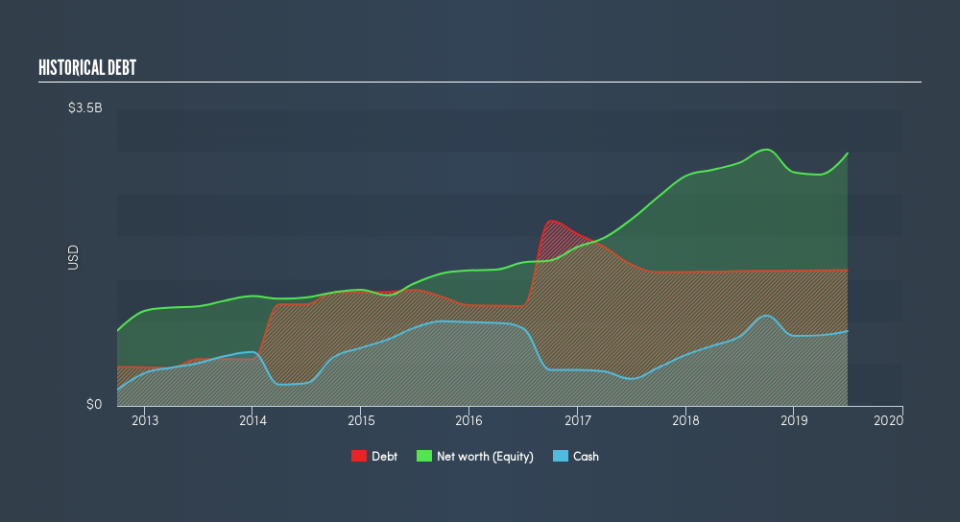Is Jazz Pharmaceuticals (NASDAQ:JAZZ) A Risky Investment?

Howard Marks put it nicely when he said that, rather than worrying about share price volatility, 'The possibility of permanent loss is the risk I worry about... and every practical investor I know worries about.' When we think about how risky a company is, we always like to look at its use of debt, since debt overload can lead to ruin. As with many other companies Jazz Pharmaceuticals plc (NASDAQ:JAZZ) makes use of debt. But should shareholders be worried about its use of debt?
Why Does Debt Bring Risk?
Debt assists a business until the business has trouble paying it off, either with new capital or with free cash flow. If things get really bad, the lenders can take control of the business. However, a more usual (but still expensive) situation is where a company must dilute shareholders at a cheap share price simply to get debt under control. Of course, debt can be an important tool in businesses, particularly capital heavy businesses. The first thing to do when considering how much debt a business uses is to look at its cash and debt together.
Check out our latest analysis for Jazz Pharmaceuticals
What Is Jazz Pharmaceuticals's Net Debt?
As you can see below, Jazz Pharmaceuticals had US$1.60b of debt, at June 2019, which is about the same the year before. You can click the chart for greater detail. However, it also had US$882.8m in cash, and so its net debt is US$719.9m.
How Healthy Is Jazz Pharmaceuticals's Balance Sheet?
The latest balance sheet data shows that Jazz Pharmaceuticals had liabilities of US$369.5m due within a year, and liabilities of US$2.14b falling due after that. Offsetting this, it had US$882.8m in cash and US$311.2m in receivables that were due within 12 months. So it has liabilities totalling US$1.31b more than its cash and near-term receivables, combined.
Given Jazz Pharmaceuticals has a market capitalization of US$7.69b, it's hard to believe these liabilities pose much threat. Having said that, it's clear that we should continue to monitor its balance sheet, lest it change for the worse.
We use two main ratios to inform us about debt levels relative to earnings. The first is net debt divided by earnings before interest, tax, depreciation, and amortization (EBITDA), while the second is how many times its earnings before interest and tax (EBIT) covers its interest expense (or its interest cover, for short). The advantage of this approach is that we take into account both the absolute quantum of debt (with net debt to EBITDA) and the actual interest expenses associated with that debt (with its interest cover ratio).
Jazz Pharmaceuticals's net debt is only 0.72 times its EBITDA. And its EBIT easily covers its interest expense, being 10.6 times the size. So you could argue it is no more threatened by its debt than an elephant is by a mouse. Also good is that Jazz Pharmaceuticals grew its EBIT at 18% over the last year, further increasing its ability to manage debt. When analysing debt levels, the balance sheet is the obvious place to start. But ultimately the future profitability of the business will decide if Jazz Pharmaceuticals can strengthen its balance sheet over time. So if you want to see what the professionals think, you might find this free report on analyst profit forecasts to be interesting.
Finally, a business needs free cash flow to pay off debt; accounting profits just don't cut it. So we always check how much of that EBIT is translated into free cash flow. During the last three years, Jazz Pharmaceuticals generated free cash flow amounting to a very robust 86% of its EBIT, more than we'd expect. That puts it in a very strong position to pay down debt.
Our View
Happily, Jazz Pharmaceuticals's impressive conversion of EBIT to free cash flow implies it has the upper hand on its debt. And that's just the beginning of the good news since its interest cover is also very heartening. Looking at the bigger picture, we think Jazz Pharmaceuticals's use of debt seems quite reasonable and we're not concerned about it. While debt does bring risk, when used wisely it can also bring a higher return on equity. We'd be motivated to research the stock further if we found out that Jazz Pharmaceuticals insiders have bought shares recently. If you would too, then you're in luck, since today we're sharing our list of reported insider transactions for free.
When all is said and done, sometimes its easier to focus on companies that don't even need debt. Readers can access a list of growth stocks with zero net debt 100% free, right now.
We aim to bring you long-term focused research analysis driven by fundamental data. Note that our analysis may not factor in the latest price-sensitive company announcements or qualitative material.
If you spot an error that warrants correction, please contact the editor at editorial-team@simplywallst.com. This article by Simply Wall St is general in nature. It does not constitute a recommendation to buy or sell any stock, and does not take account of your objectives, or your financial situation. Simply Wall St has no position in the stocks mentioned. Thank you for reading.

 Yahoo Finance
Yahoo Finance 
